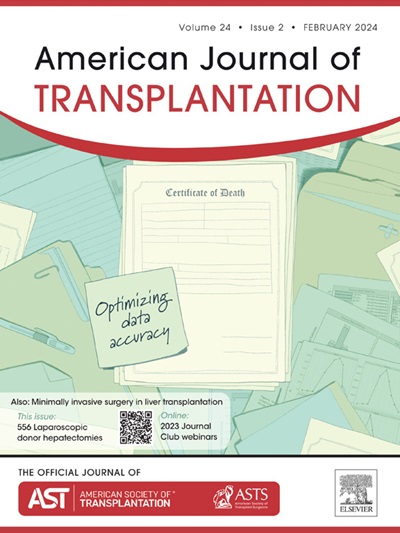Long-term persistence of seroprotection against measles following measles-mumps-rubella vaccination administered before and after pediatric liver transplantation
IF 8.9
2区 医学
Q1 SURGERY
引用次数: 0
Abstract
Liver transplantation (LT) recipients are susceptible to infections, including measles. Concerns about the safety and efficacy of live-attenuated vaccines, such as the measles-mumps-rubella (MMR) vaccine, have led to hesitancy among providers in administering them to immunocompromised patients. This 9-year interventional study assessed seroprotection against measles following MMR vaccination in pediatric LT recipients. Of 119 participants enrolled, 60 (50%) were seroprotected against measles after transplantation. Among the 59 nonseroprotected participants, 56 fulfilled safety criteria and received MMR vaccination with a seroprotection rate of 90% (95% confidence interval [CI], 73%-98%) after a first dose, 95% (95% CI, 85%-99%) after primary vaccination with 1 to 3 doses, comparable to nonimmunocompromized populations. However, measles antibodies declined over time, suggesting the need for regular monitoring, and booster doses. Half of the vaccinees (26/53, 49%) subsequently lost seroprotection. Among them, 23 received additional doses of MMR, with a high seroconversion rate. At their last follow-up (median, 6.1 years; interquartile range, 3.0-8.1 after inclusion), 63% (95% CI, 49%-75%) of all vaccinees were seroprotected against measles. In conclusion, MMR vaccination in pediatric LT recipients offers seroprotection against measles, but long-term immunity should be monitored closely.

小儿肝移植前后接种麻疹-流行性腮腺炎-风疹疫苗后对麻疹的血清保护作用的长期持续性。
肝移植(LT)受者很容易受到包括麻疹在内的感染。麻疹-腮腺炎-风疹(MMR)疫苗等减毒活疫苗的安全性和有效性令人担忧,导致医疗机构在为免疫力低下的患者接种疫苗时犹豫不决。这项为期 9 年的干预性研究评估了小儿麻痹症患者接种麻疹-腮腺炎-风疹减毒疫苗后对麻疹的血清保护作用。在 119 名参加者中,有 60 人(50%)在移植后获得了麻疹血清保护。在59名未获得血清保护的受试者中,56人符合安全标准,接种麻风腮疫苗后,第一剂的血清保护率为90%(95%CI 73-98%),接种1至3剂初级疫苗后的血清保护率为95%(95%CI 85-99%),与非免疫力低下人群相当。然而,麻疹抗体会随着时间的推移而下降,这表明有必要进行定期监测和加强接种。半数接种者(26/53,49%)随后失去了血清保护作用。其中 23 人接受了麻风腮疫苗的强化接种,血清转换率很高。在最后一次随访中(中位数为 6.1 年,IQR 为 3.0-8.1 年后),63%(95%CI 49-75%)的疫苗接种者获得了麻疹血清保护。总之,为小儿麻疹疫苗接种者接种麻风腮疫苗可提供麻疹血清保护,但应密切监测其长期免疫力。临床试验注册:该试验已在美国国立卫生研究院(Clinicaltrials.gov)注册,注册号为NCT01770119。
本文章由计算机程序翻译,如有差异,请以英文原文为准。
求助全文
约1分钟内获得全文
求助全文
来源期刊
CiteScore
18.70
自引率
4.50%
发文量
346
审稿时长
26 days
期刊介绍:
The American Journal of Transplantation is a leading journal in the field of transplantation. It serves as a forum for debate and reassessment, an agent of change, and a major platform for promoting understanding, improving results, and advancing science. Published monthly, it provides an essential resource for researchers and clinicians worldwide.
The journal publishes original articles, case reports, invited reviews, letters to the editor, critical reviews, news features, consensus documents, and guidelines over 12 issues a year. It covers all major subject areas in transplantation, including thoracic (heart, lung), abdominal (kidney, liver, pancreas, islets), tissue and stem cell transplantation, organ and tissue donation and preservation, tissue injury, repair, inflammation, and aging, histocompatibility, drugs and pharmacology, graft survival, and prevention of graft dysfunction and failure. It also explores ethical and social issues in the field.

 求助内容:
求助内容: 应助结果提醒方式:
应助结果提醒方式:


